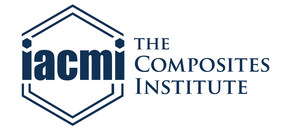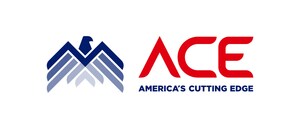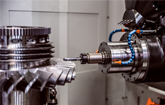IACMI Announces Key Partnerships with Texas A&M Engineering Experiment Station and Marshall University to establish Machine Tools Workforce Training Centers
New ACE hubs to help revitalize American manufacturing
KNOXVILLE, Tenn., July 19, 2022 /PRNewswire/ -- The Institute for Advanced Composites Manufacturing InnovationÒ (IACMI) announced today two new partnerships with the Texas A&M Engineering Experiment Station (TEES) in College Station, Texas and Marshall University in Huntington, West Virginia. These partnerships aim to revitalize U.S. manufacturing with a focus on the machine tool industry. Machine tools are a foundational element of America's advanced manufacturing capabilities, which are essential to the country's national security and continued economic vitality.
The new partnerships will advance America's Cutting Edge (ACE), a joint Department of Defense (DoD) and Department of Energy (DOE) initiative launched in 2020 to reestablish American leadership in the machine tool industry through transformative thinking, technology innovation, and workforce development. Expanding the number of training centers is a key part of ACENet, an emerging national network of regional machine tools innovation and workforce development hubs. Adding ACE hubs in these two areas will benefit the residents and manufacturing ecosystem of Texas, West Virginia, Ohio, and Kentucky.
"TEES is proud to collaborate with the DoD and IACMI to bring this program to Texas," said Scott Terry, Director of Community and Small Business Initiatives for the SecureAmerica Institute, powered by TEES. "ACE provides a unique workforce opportunity that can truly make a valuable impact for people and industry. We have already had a great deal of interest from high schools, secondary education institutions, trade schools and manufacturers, and we look forward to working with many more partners throughout the state."
"Marshall University is excited to partner in this national initiative to revitalize American manufacturing," said President Brad D. Smith. "Marshall's Robert C. Byrd Institute (RCBI) – West Virginia's Advanced Manufacturing Technology Center – has assisted manufacturers across our state and region for more than 30 years and delivered machinist training to thousands of individuals. We engage manufacturers daily, so we're keenly aware of their workforce needs and have a history of developing innovative solutions to meet those needs. This partnership with IACMI will greatly expand our efforts to prepare individuals in West Virginia, Ohio and Kentucky for in-demand manufacturing jobs right here at home."
IACMI, through an agreement with DoD's Industrial Base Analysis and Sustainment (IBAS) program, is leading an ACE industrial skills training program to scale workforce pipelines with a focus on machine tooling and advanced machining. "We have a critical workforce skills gap in this country when it comes to machine tool resources," IACMI Workforce Director Ms. Joannie Harmon said. "The training component of ACE is intended to help our nation recover, advance, and sustain technical and manufacturing positions – all to enable a strong, resilient and responsive U.S. industrial base."
Ms. Adele Ratcliff, IBAS Program Director, said, "Many people like to talk about innovators and entrepreneurship, but the real knowhow of something is embedded in the making process. Most everything that's made at scale uses a machine tool. If you know how to make it, then you know how to innovate on it faster. We want to restore the innovation within the U.S. machine tool sector."
With that goal, DoD and DOE's Oak Ridge National Laboratory (ORNL), along with IACMI, created ACE, a public-private partnership designed to help close the skills gap and restore American dominance in machine tool technology and innovation. Through ACE, DoD established a national CNC machining training program developed by University of Tennessee, Knoxville, professor Tony Schmitz. The program brings together the scientific expertise of ORNL's Manufacturing Demonstration Facility and the proven workforce development capabilities of IACMI. The first hub beyond Knoxville was announced in April 2022 in Greensboro, NC at North Carolina Agricultural and Technical State University (N.C. A&T).
Using advanced computing, robotics, and material design capabilities, ACE is rapidly developing innovative machine tool technologies that dramatically improve precision, efficiency and productivity, all key to restoring America's global competitiveness in the machine tool sector and, by extension, in advanced manufacturing. The ACE approach puts manufacturers at the center of its strategy. ACE focuses on training new experts, improving cost effectiveness especially for small and medium manufacturers and machine shops, researching and developing productivity innovations, and developing partnerships to commercialize advancements.
ACE is already transferring resulting technologies to U.S. machine tool manufacturers. One ACE-developed tool has saved small and medium U.S. machine tool shops more than 55,000 machine hours and $5 million in costs—with potential savings for the broader U.S. industry reaching into the billions across the roughly 30,000 machine shops in the U.S.
ACE uses free online and in-person, hands-on training to connect top national experts with students and incumbent industrial workers from all backgrounds, levels of education, and work experience to catalyze awareness and interest in all facets of machining, including software development, metrology, design, operation, and entrepreneurship. To date, ACE has delivered online courses in Computer Numerical Control (CNC) machining to more than 2,500 students from all 50 states and in-person bootcamp style training to more than 100 students, all at no cost to participants.
"People love to make things, and when they do, they feel good about themselves," added Ms. Ratcliff. "The ACE curriculum allows people to experience machining often for the first time. By expanding those opportunities for more people to go through hands-on training, we're hoping to inspire the next generation of manufacturers in this country."
As an engineering research agency of Texas, the Texas A&M Engineering Experiment Station (TEES) performs quality research driven by world problems; strengthens and expands the state's workforce through educational partnerships and training; and develops and transfers technology to industry. TEES partners with academic institutions, governmental agencies, industries and communities to solve problems to help improve the quality of life, promote economic development and enhance educational systems.
For more than 30 years, the Robert C. Byrd Institute (RCBI) at Marshall University has served as a one-stop resource for manufacturers, entrepreneurs and makers of all sizes and ages. RCBI's Advanced Manufacturing Technology Centers provide leading-edge equipment, innovative skills training and comprehensive industrial expertise so entrepreneurs and existing businesses can innovate, create jobs and thrive. Encouraging the future industrial workforce is a key element of RCBI's outreach through its hands-on STEM camps that introduce students to engineering, 3D printing, computer-aided design, robotics as they explore all facets of manufacturing.
IACMI – The Composites Institute is a 130-plus member community of industry, universities, national laboratories, and federal, state, and local government agencies working together to accelerate advanced composites design, manufacturing, technical innovation, and workforce solutions to enable a cleaner and more sustainable, more secure, and more competitive U.S. economy. IACMI is managed by the Collaborative Composite Solutions Corporation (CCS), a not-for-profit organization established by The University of Tennessee Research Foundation. A Manufacturing USA institute, IACMI is supported by the U.S. Department of Energy's Advanced Manufacturing Office, as well as key state and industry partners.
SOURCE IACMI - The Composites Institute

WANT YOUR COMPANY'S NEWS FEATURED ON PRNEWSWIRE.COM?
Newsrooms &
Influencers
Digital Media
Outlets
Journalists
Opted In





Share this article